Choosing the perfect hotel can feel overwhelming, with countless reviews and star ratings scattered across the web. How do you know which sources to trust when a five-star review on one site might correspond to a three-star experience on another? This guide cuts through that noise. We’ve meticulously analyzed the top hotel rating websites to show you which platforms offer the most reliable reviews, authentic user experiences, and hidden deals for your next trip.
This resource is designed to help you quickly identify the best tools for your specific needs. For each website on our list, we provide a detailed breakdown of its unique strengths, weaknesses, and ideal use cases. You will find screenshots for visual reference and direct links to get you started immediately. We delve into the distinct features of each platform, from massive aggregators like Booking.com and Expedia to specialized review sites such as Oyster.com and Forbes Travel Guide.
By the end of this comprehensive list, you’ll understand exactly where to look for verified guest feedback, professional photography, or the best price comparisons. Our goal is to equip you with a clear strategy for using these resources effectively, ensuring your next hotel booking is a confident and informed decision, perfectly matched to your travel style and budget.
1. HotelsEscape
HotelsEscape carves out a unique and authoritative space among hotel rating websites by functioning as a comprehensive travel intelligence hub. It excels not just in providing ratings but in delivering a rich tapestry of content that informs the entire travel planning process. The platform’s strength lies in its blend of timely industry news, exclusive deals, and deeply insightful reviews, positioning it as an indispensable resource for the discerning traveler.
Unlike platforms that focus solely on user-generated scores, HotelsEscape offers a curated experience. It dives deep into hotel openings and renovations, provides updates on loyalty programs, and surfaces exclusive promotions, giving users a strategic advantage in their booking decisions. This makes it ideal for travelers who want to understand the “why” behind a hotel’s reputation, not just its numerical rating.
Key Strengths and Features
- Industry News and Updates: Stay informed with the latest news on major hotel openings, property renovations, and significant changes in hotel loyalty programs. This is invaluable for travelers who frequent certain brands or are looking for the newest luxury experiences.
- Exclusive Deals and Promotions: The site consistently features exclusive flash sales and seasonal promotions, offering tangible savings that might not be available on mainstream booking sites.
- In-Depth, Experience-Based Reviews: Reviews on HotelsEscape go beyond a simple star rating. They provide honest, detailed narratives based on real stays, giving you a clear picture of what to expect, from service quality to room amenities.
- Holistic Travel Planning: The platform enhances your trip planning with curated restaurant recommendations and local activity guides, transforming a simple hotel search into a complete itinerary-building tool.
User Experience and Practical Tips
The website boasts a clean, user-friendly interface that caters effectively to both budget-conscious and luxury-seeking travelers. To maximize its value, regularly check the “Deals” section for time-sensitive offers. Also, use the news updates to identify newly renovated hotels, which often provide a superior experience before their rates increase.
Best Use Case: Ideal for the “informed traveler” who values context, industry news, and expert curation alongside user ratings. It’s perfect for planning trips where the quality of the hotel and overall experience are paramount.
Pros:
- Comprehensive coverage of hotel news and industry trends
- Regularly updated with exclusive, money-saving deals
- Honest, in-depth reviews based on real experiences
- Curated guides for restaurants and local activities
Cons:
- No direct booking functionality; redirects to external sites
- Pricing details for deals can vary and are not always upfront
Website: HotelsEscape.com
2. Tripadvisor
Tripadvisor stands as a titan among hotel rating websites, distinguished by its sheer volume of user-generated content. With over a billion reviews, its primary strength lies in the breadth and depth of traveler experiences available for nearly any destination imaginable. The platform aggregates reviews, photos, and detailed ratings on specific aspects like cleanliness, service, location, and value, providing a multifaceted view of each property. This granular detail allows users to move beyond a simple star rating and understand the specific strengths and weaknesses of a hotel from the perspective of past guests.
What truly sets Tripadvisor apart is its active community. New reviews are constantly added, ensuring the information is current. The user-uploaded photos are particularly valuable, offering a more authentic, unvarnished look at rooms and amenities compared to professionally staged marketing images. This makes it an indispensable tool for cross-referencing the official presentation of a hotel with real-world guest experiences.
Key Features & User Tips
- Massive Review Database: Access an unparalleled collection of over 1 billion reviews covering approximately 8 million establishments globally.
- Detailed Rating Breakdown: Evaluate hotels based on specific criteria like service, cleanliness, and value, not just an overall score.
- User-Submitted Photos: View unfiltered photos from actual travelers to get a realistic sense of the property.
Practical Tip: To mitigate the risk of fake reviews, focus on reviewers with extensive contribution histories. Also, pay close attention to management responses to negative feedback, as this can reveal a lot about a hotel’s customer service culture.
| Pros | Cons |
|---|---|
| Extremely comprehensive database of properties | Potential for biased or fake reviews |
| Active community provides up-to-date info | Can feel overwhelming without filters |
| Authentic user photos offer real insight | Interface can be cluttered with ads |
Website: https://www.tripadvisor.com
3. Booking.com
Booking.com has evolved from a simple booking engine into one of the most trusted hotel rating websites, primarily because its review system is exclusive to guests who have completed a stay. This verification process ensures a high level of authenticity, as only people who have actually paid for and experienced the hotel can leave feedback. The platform excels at providing detailed scores across specific categories like staff, facilities, cleanliness, comfort, value for money, and location, giving travelers a granular and reliable snapshot of a property’s performance.
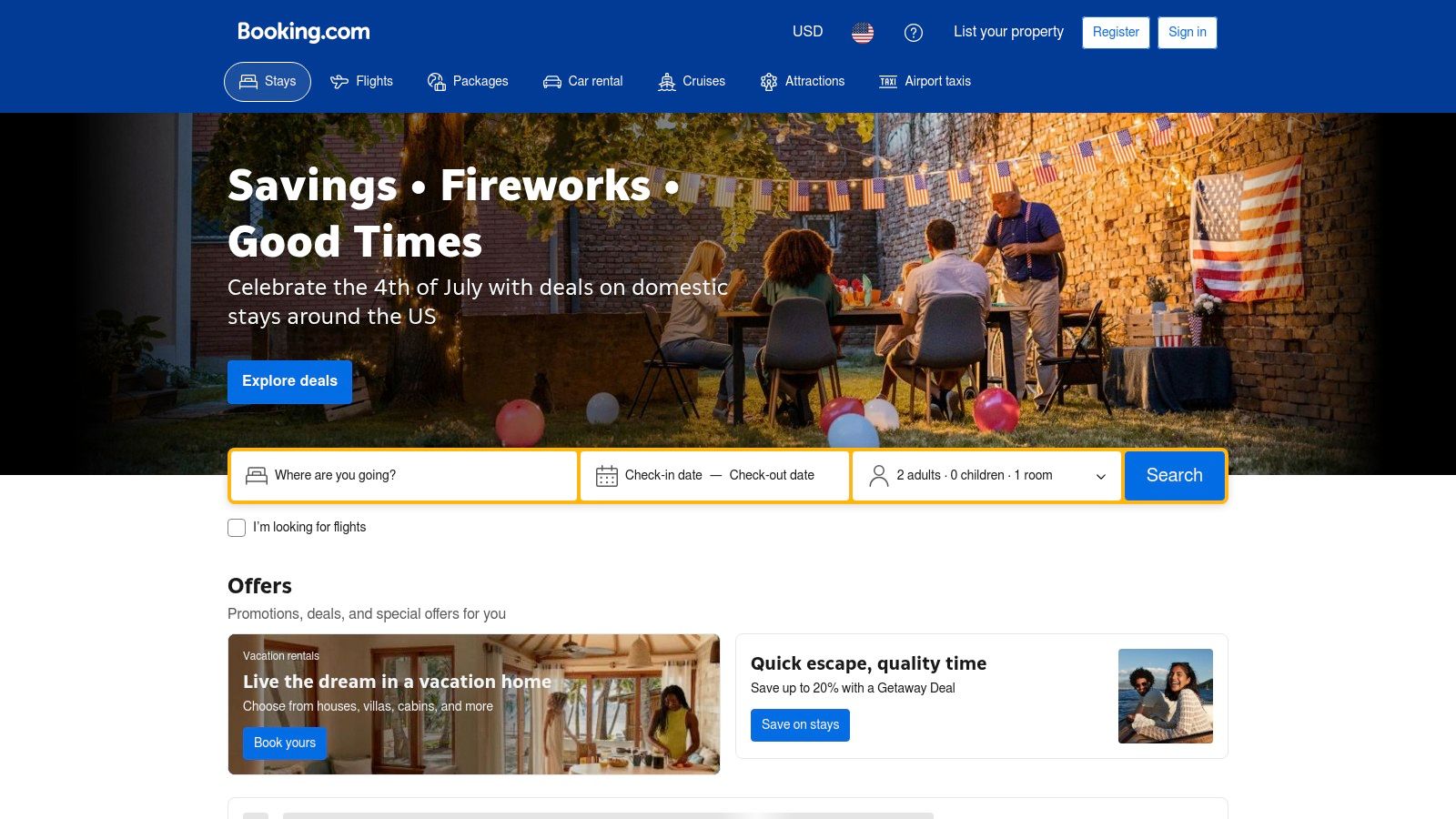
What makes Booking.com a powerhouse is the seamless integration of these verified ratings directly into the search and booking process. Users can easily filter search results by review score, a feature that significantly speeds up the process of finding high-quality accommodations. Its massive inventory, which spans over 28 million listings from luxury hotels to apartments and unique stays, combined with this dependable review data, makes it an indispensable, all-in-one tool for both planning and booking travel.
Key Features & User Tips
- Verified Guest Reviews: Only guests who have completed their stay can leave a review, ensuring reliability and authenticity.
- Categorized Rating Scores: See how a property scores on specific aspects like cleanliness, comfort, staff, and location.
- Genius Loyalty Program: Frequent users can unlock discounts and travel perks, such as free breakfasts or room upgrades.
Practical Tip: Use the map view in conjunction with the “Review Score” filter to find highly-rated hotels in your desired location. Pay close attention to recent reviews to get the most current picture of the hotel’s condition and service. When considering booking.com for your next trip, you can learn more about its place among the best hotel booking sites.
| Pros | Cons |
|---|---|
| Extremely reliable verified-guest reviews | Some listings have strict cancellation policies |
| Extensive inventory of all accommodation types | Focus is more on booking than community features |
| User-friendly interface with powerful filters | Prices can fluctuate based on demand |
Website: https://www.booking.com
4. Hotels.com
Hotels.com secures its spot on the list of top hotel rating websites by brilliantly combining a vast booking platform with an integrated, user-friendly review system and a compelling loyalty program. While primarily an online travel agent (OTA), its strength lies in the sheer volume of verified guest reviews tied directly to bookings. This ensures that the feedback comes from people who have actually stayed at the property, adding a layer of authenticity to the ratings.
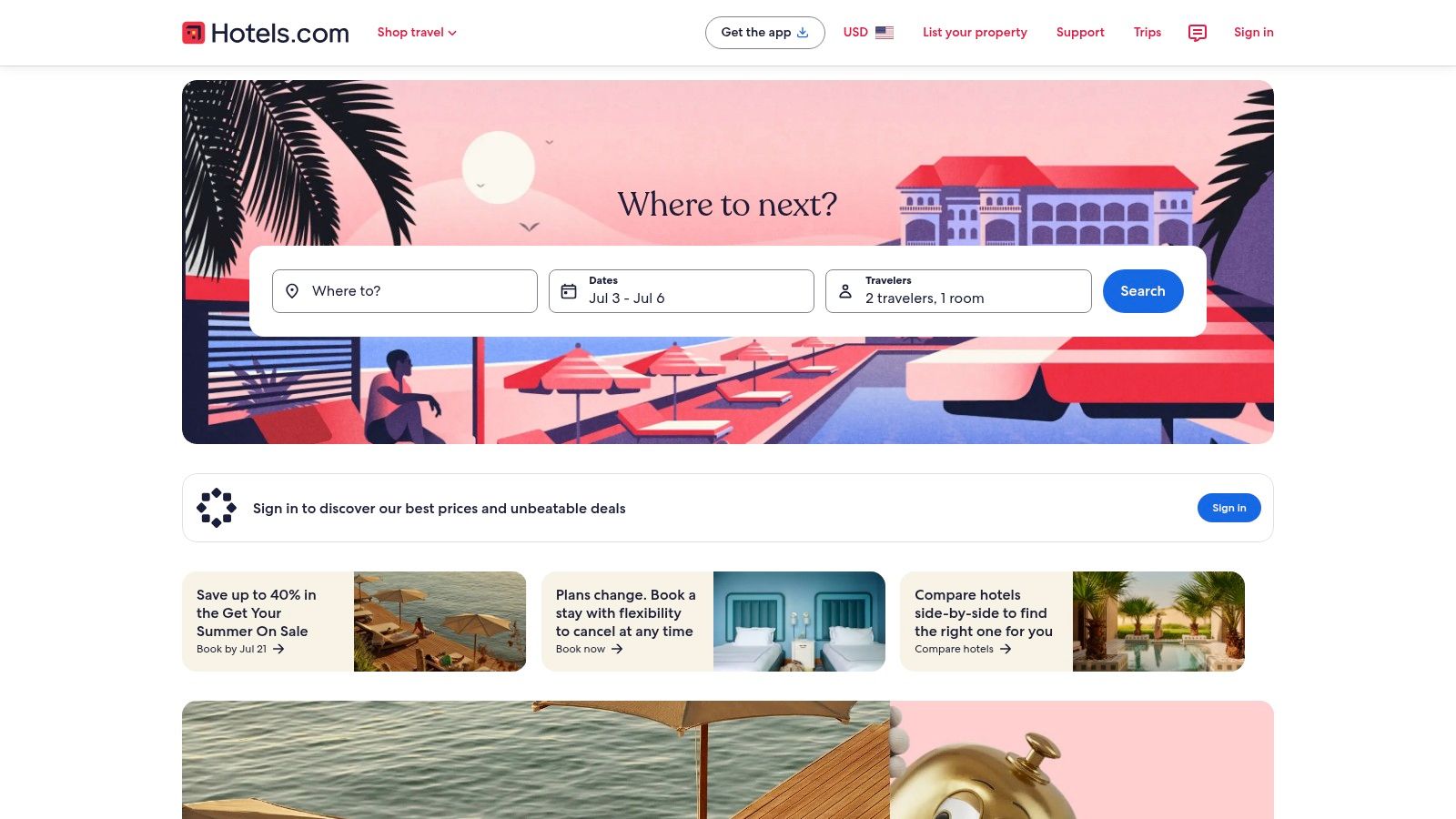
The platform’s standout feature is its simplicity. User ratings are clearly displayed, often focusing on key areas like cleanliness, service, and property condition. What truly distinguishes Hotels.com is its Rewards program, which incentivizes repeat usage. By collecting “stamps” for each night stayed, users can earn a free reward night, making it an excellent choice for frequent travelers who want their loyalty to translate into tangible savings. This creates a powerful ecosystem where booking and reviewing go hand-in-hand.
Key Features & User Tips
- Vast Property Selection: Search and compare over 500,000 properties across the globe, from budget motels to luxury resorts.
- Verified Guest Reviews: Read reviews exclusively from guests who have completed a stay booked through the site.
- Hotels.com Rewards: Collect one “stamp” for every night you stay and get a free reward night after collecting 10 stamps.
Practical Tip: Leverage the extensive filter options to narrow down choices. You can filter not only by price and star rating but also by specific amenities, neighborhood, and, most importantly, guest rating score to quickly find highly-regarded hotels.
| Pros | Cons |
|---|---|
| User-friendly interface with detailed filters | Some users report issues with customer service |
| Excellent rewards program for free nights | Review details can be less in-depth than on dedicated review sites |
| Frequent promotions and member-only discounts | Fewer user-submitted photos than competitors |
Website: https://www.hotels.com
5. Expedia
Expedia functions as an all-in-one travel powerhouse where hotel ratings are seamlessly integrated into the booking process. While primarily known as an online travel agency (OTA), its role as one of the key hotel rating websites is cemented by a vast collection of verified guest reviews. This verification is crucial; only travelers who have completed a stay booked through Expedia can leave a review, which significantly enhances the credibility and reliability of the feedback provided. The platform allows users to sort accommodations based on guest ratings, offering a quick way to identify top-performing properties.
What distinguishes Expedia is its integrated ecosystem. Users can assess hotel ratings while simultaneously comparing flight prices and car rental options, making it exceptionally efficient for planning an entire trip in one place. The reviews often provide practical insights directly tied to the booking experience, covering everything from the check-in process to the quality of the amenities advertised. This holistic approach helps travelers make informed decisions based not just on ratings, but on the overall value and convenience of a bundled travel package.
Key Features & User Tips
- Verified Guest Reviews: Access ratings and feedback exclusively from customers who have completed a stay, ensuring authenticity.
- Extensive Accommodation Network: Browse a massive global inventory of hotels, resorts, and vacation rentals.
- Expedia Rewards Program: Earn points on bookings that can be redeemed for future travel, adding a layer of value for frequent users.
Practical Tip: Leverage Expedia’s package deals. Bundling your hotel with a flight or car rental can often unlock significant discounts that are not available when booking each component separately. Always compare the bundled price against individual bookings to confirm the savings.
| Pros | Cons |
|---|---|
| Ability to bundle services for discounts | Prices can sometimes be higher than booking direct |
| User-friendly interface with great filters | Focus is more on booking than community interaction |
| Verified reviews increase trustworthiness | Review details may be less in-depth than on dedicated review sites |
Website: https://www.expedia.com
6. Yelp
While primarily known for restaurant and local business reviews, Yelp has carved out a significant niche as a reliable hotel rating website. Its strength lies in its deeply engaged, community-driven user base that provides candid, often detailed, accounts of their stays. Unlike platforms solely dedicated to travel, Yelp reviews often contextualize a hotel within its local environment, offering valuable insights into nearby attractions, dining, and neighborhood safety from a local’s or seasoned visitor’s perspective. This provides a holistic view that goes beyond the hotel’s property lines.
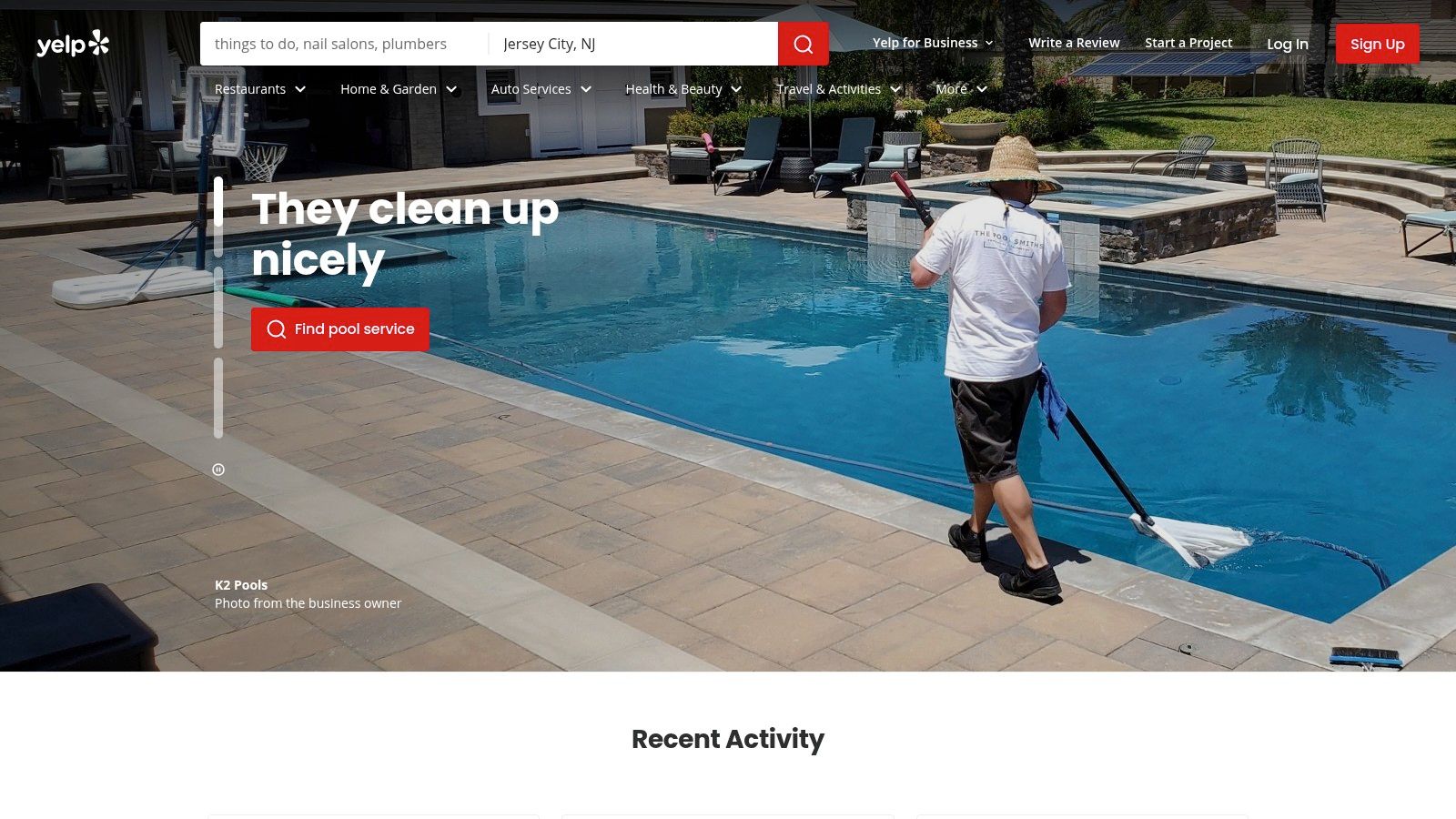
Yelp’s platform encourages user-generated photos and detailed feedback, which can be a treasure trove of authentic information. The location-based search, enhanced with filters for price, rating, and specific amenities, makes it easy to find suitable options. Because users are reviewing everything from cafes to dry cleaners, their hotel reviews often come with a grounded, no-nonsense tone, making Yelp a great resource for cross-referencing the polished reviews found on dedicated travel sites.
Key Features & User Tips
- Massive Review Database: Access over 224 million crowdsourced reviews across a wide array of businesses, including hotels.
- User-Generated Photos: Get a real-world look at rooms and hotel grounds through photos submitted by actual guests.
- Location-Based Search: Use powerful filters to narrow down hotel options by price, user rating, and available amenities.
Practical Tip: Look for the “Elite Squad” badge on reviewer profiles. These are Yelp’s most active and trusted contributors, and their reviews are often more detailed and reliable. Their insights can be particularly valuable when assessing a hotel’s quality.
| Pros | Cons |
|---|---|
| Authentic reviews from a large user base | Potential for biased or outlier reviews |
| Strong local context for destinations | Hotel selection may not be as vast |
| Free business profiles for hotels | Search focus is not solely on travel |
Website: https://www.yelp.com
7. Google Reviews
Google Reviews has become a ubiquitous and highly influential hotel rating website, primarily due to its seamless integration with Google’s core products, Google Search and Google Maps. Its greatest strength is accessibility; ratings and reviews appear directly within search results and map listings, eliminating the need to navigate to a separate platform. This makes it an incredibly convenient first stop for travelers looking for quick, location-based feedback on accommodations.
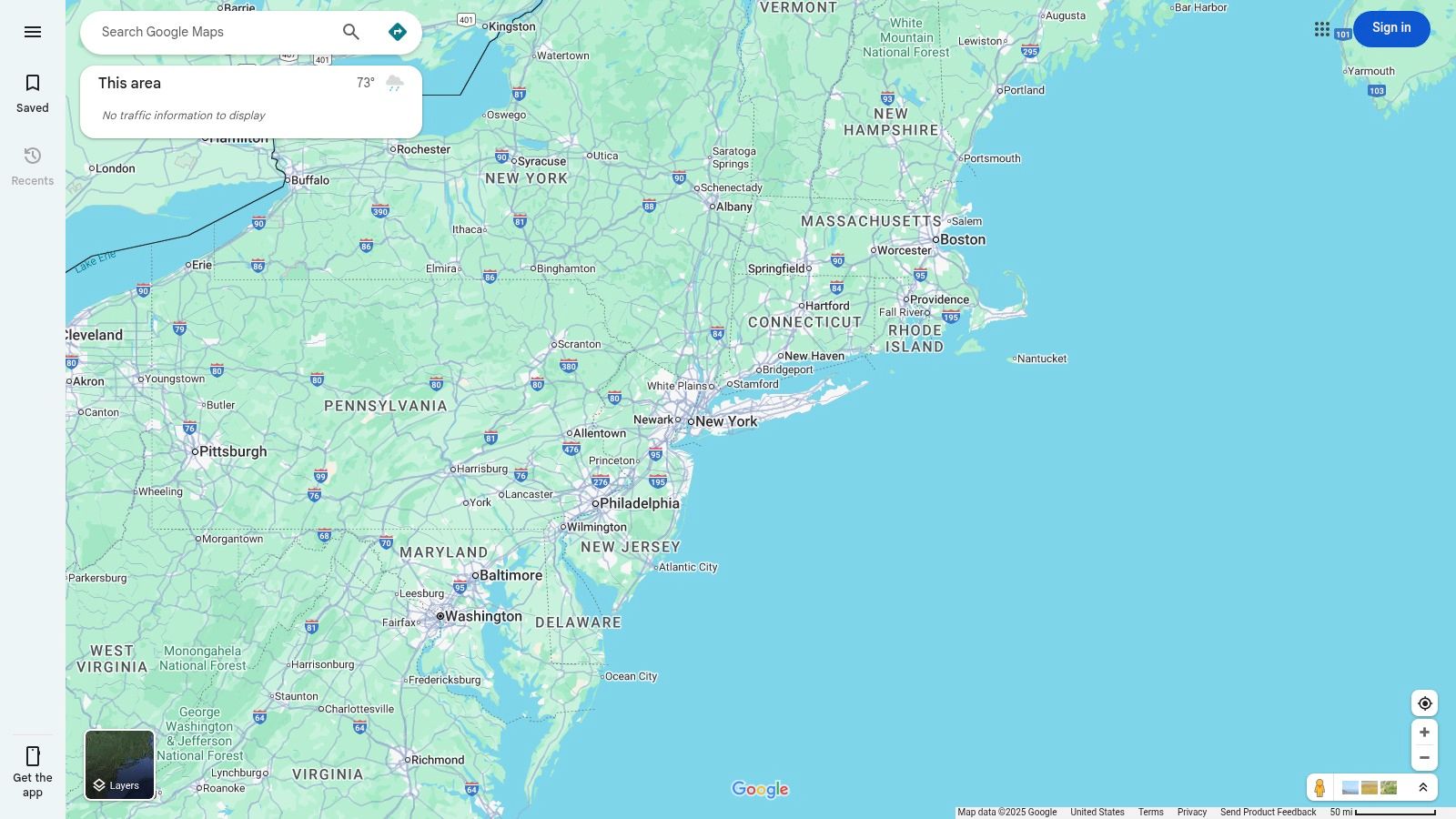
What makes Google Reviews stand out is its massive user base, which translates into a high volume of recent reviews for a vast number of properties, from major chains to small, independent hotels. The platform often aggregates review scores from other travel sites, providing a useful at-a-glance summary. While individual reviews might lack the granular detail found on specialized sites, the sheer quantity of feedback offers a reliable crowd-sourced perspective on a hotel’s overall quality and service.
Key Features & User Tips
- Direct Google Maps Integration: Instantly see hotel ratings and locations side-by-side, which is perfect for planning based on proximity to attractions.
- User Reviews & Photos: Access a wealth of feedback from a diverse, global user base, complete with star ratings and traveler photos.
- Aggregated Review Scores: View a “Reviews summary” that often pulls in ratings from other major hotel rating websites for a more comprehensive overview.
Practical Tip: Use the map view to compare the ratings of several hotels within a specific neighborhood simultaneously. This is highly effective for finding the best-rated option in your desired location without having to perform multiple searches.
| Pros | Cons |
|---|---|
| High visibility and easy access in search | Reviews tend to be less detailed or in-depth |
| Integrated directly with Google Maps | Lacks the advanced filtering options of travel sites |
| Huge volume of recent user reviews | No dedicated community or travel forum features |
Website: https://maps.google.com
8. Kayak
Kayak operates as a powerful travel metasearch engine, distinguishing itself by aggregating deals and reviews from hundreds of other travel sites. Instead of hosting its own review system, it pulls data from major platforms like Booking.com, Agoda, and Hotels.com, presenting a consolidated score. This makes it an incredibly efficient tool for users who want a bird’s-eye view of a hotel’s reputation across the web without having to visit multiple sites. The primary strength of Kayak as one of the top hotel rating websites is its focus on price comparison alongside these aggregated ratings.
This consolidated approach allows travelers to quickly cross-reference a hotel’s price with its overall online sentiment. Kayak’s user-friendly interface displays the aggregated review score prominently next to the price, enabling rapid assessment. You can see how a property is rated across different segments of the internet, providing a more balanced and comprehensive perspective than a single-source platform might offer. This blend of price and reputation data in one place is what secures its spot as a vital research tool.
Key Features & User Tips
- Aggregated Reviews: See a combined review score compiled from numerous major booking and review websites.
- Comprehensive Price Comparison: Simultaneously compare accommodation prices from a vast array of online travel agencies and direct booking sites.
- Price Alerts: Set up notifications to track price changes for a specific hotel or destination, helping you book at the optimal time.
Practical Tip: Use Kayak’s robust filtering options to your advantage. You can sort not only by price and star rating but also by review score and specific themes like “Family-Friendly” or “Luxury,” which helps narrow down options based on both cost and quality.
| Pros | Cons |
|---|---|
| Gathers prices and reviews from many sources | Redirects to third-party sites to book |
| Excellent price alert and tracking features | Review details can be less granular |
| Clean, user-friendly interface with good filters | Fewer direct user-generated insights |
Website: https://www.kayak.com
9. Trivago
Trivago operates primarily as a hotel metasearch engine, but it carves out its space among hotel rating websites by powerfully integrating user reviews into its price comparison functionality. Its core strength is aggregating hotel deals from over 400 booking sites, allowing users to see a vast spectrum of pricing for a single property in one place. This price transparency is then paired with a consolidated rating score, pulled from various sources, giving travelers a quick, at-a-glance understanding of a hotel’s reputation alongside its cost.
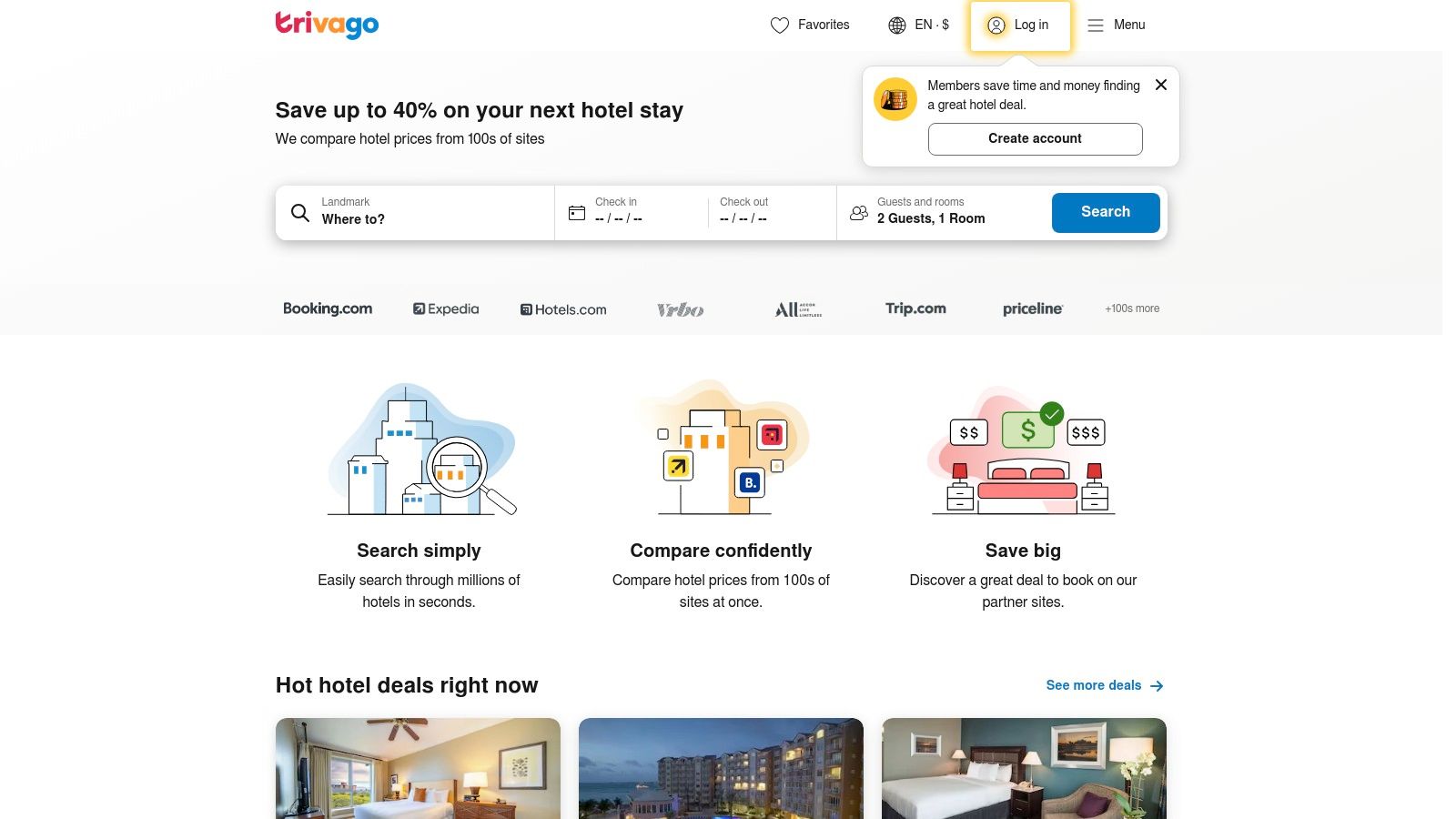
What makes Trivago a unique tool is its focus on the intersection of price and quality. While it doesn’t host its own user reviews, it effectively compiles them, presenting an average score that helps users quickly vet properties. This allows travelers to filter their search not just by price or amenities but also by a reliable, aggregated guest rating, ensuring they don’t sacrifice quality for a good deal. The platform is designed for efficiency, helping users find the best possible value by comparing options across the web.
Key Features & User Tips
- Price Comparison Engine: Compares hotel prices from hundreds of online travel agencies and booking sites like Booking.com, Expedia, and Hotels.com.
- Aggregated Rating System: Displays a synthesized rating score compiled from numerous external review sources for a balanced perspective.
- Comprehensive Filtering: Allows users to narrow down options by rating, price, location, and specific amenities to find the perfect match.
Practical Tip: Once you find a hotel you like, click through several of the different booking site offers. Sometimes a slightly higher price on a more reputable booking site might come with better cancellation policies or loyalty perks, offering superior overall value.
| Pros | Cons |
|---|---|
| Excellent for finding competitive pricing | Redirects to third-party sites to complete booking |
| Aggregates ratings from multiple sources | Does not host its own unique review community |
| Clean interface focused on price comparison | Featured deals may not always be the cheapest option |
Website: https://www.trivago.com
10. Agoda
Agoda has carved out a significant niche among hotel rating websites, particularly for travelers heading to Asia, where its inventory and pricing are often unmatched. While it operates globally, its primary strength lies in offering highly competitive rates and a vast selection of properties across Asian markets, from major city hotels to remote guesthouses. The platform integrates user ratings directly into its booking process, ensuring that every review is from a verified guest who has completed a stay. This verification system adds a layer of trust to the scores and feedback provided.
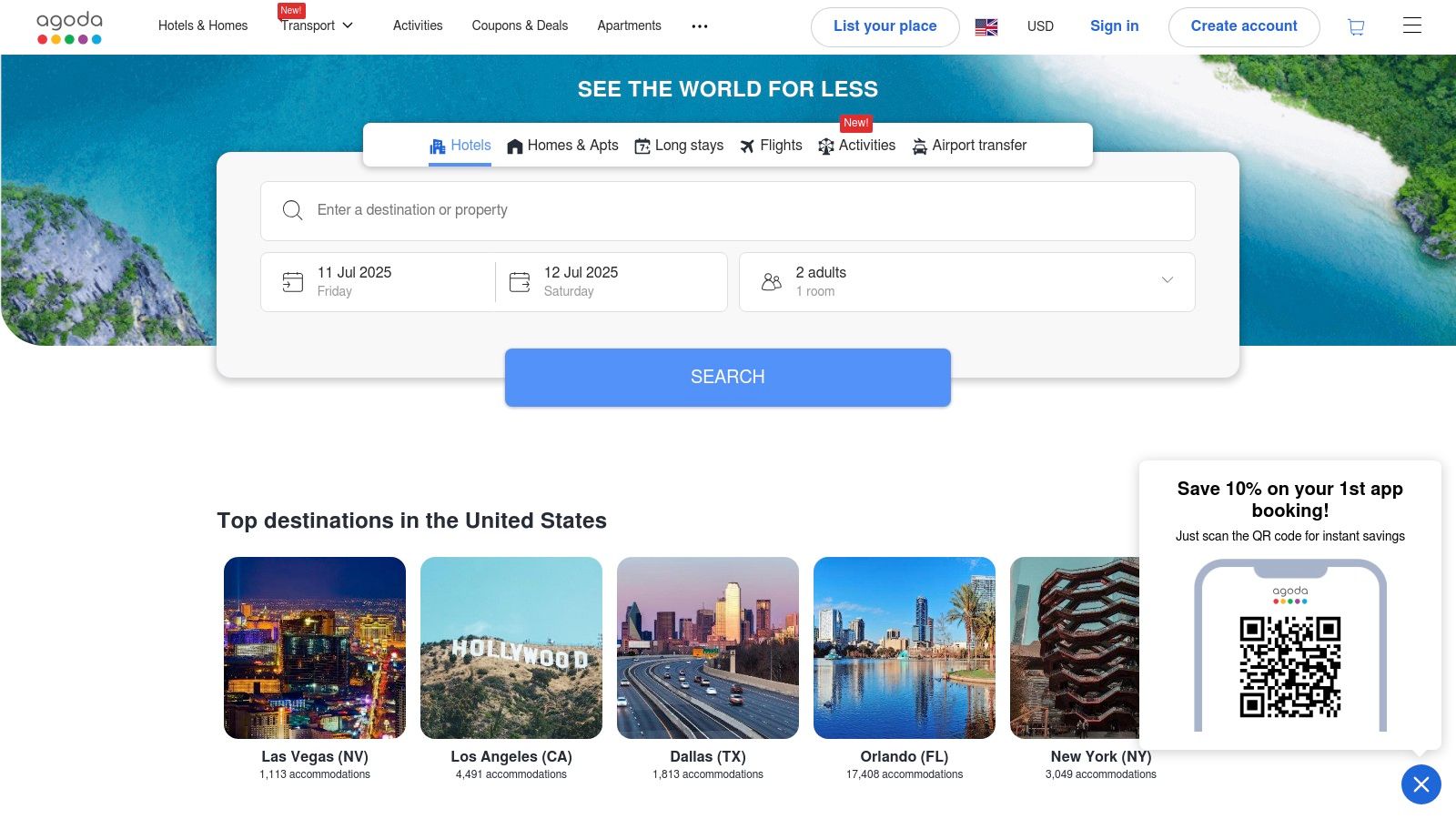
What makes Agoda a compelling choice is its clean, user-friendly interface combined with powerful filtering options. Users can easily sort properties not just by rating but also by specific amenities, location, and price, making it simple to find a hotel that fits precise needs. The platform is also known for its “Agoda Insider Deals” and other membership perks, which can offer substantial savings, making it a go-to for budget-conscious travelers who still want to rely on authentic guest feedback.
Key Features & User Tips
- Verified Guest Reviews: All ratings and reviews come from guests who have booked and stayed through the platform, ensuring authenticity.
- Strong Asian Market Focus: Access an extensive inventory and often the best prices for hotels and accommodations throughout Asia.
- Member-Only Deals: Sign up for an account to unlock special “Insider Deals” and other discounts on properties worldwide.
Practical Tip: Always log in before searching. Agoda frequently shows lower prices and exclusive deals to registered members that are not available to guest users. Compare the final price at checkout, as taxes and fees can be displayed differently depending on the region.
| Pros | Cons |
|---|---|
| Competitive pricing, especially in Asia | Customer service experiences can be inconsistent |
| User-friendly interface with detailed filters | Best deals often require membership log-in |
| All reviews are from verified guests | Pricing can sometimes be less clear upfront |
Website: https://www.agoda.com
11. Oyster.com
Oyster.com carves out a unique niche among hotel rating websites by prioritizing professional, expert-led reviews over user-generated content. Instead of crowdsourcing opinions, Oyster sends its own trained investigators to personally visit, photograph, and assess each property. This “we’ve been there” approach results in exceptionally detailed and unbiased evaluations, giving travelers a trusted, journalistic perspective on a hotel’s quality, atmosphere, and true-to-life condition.
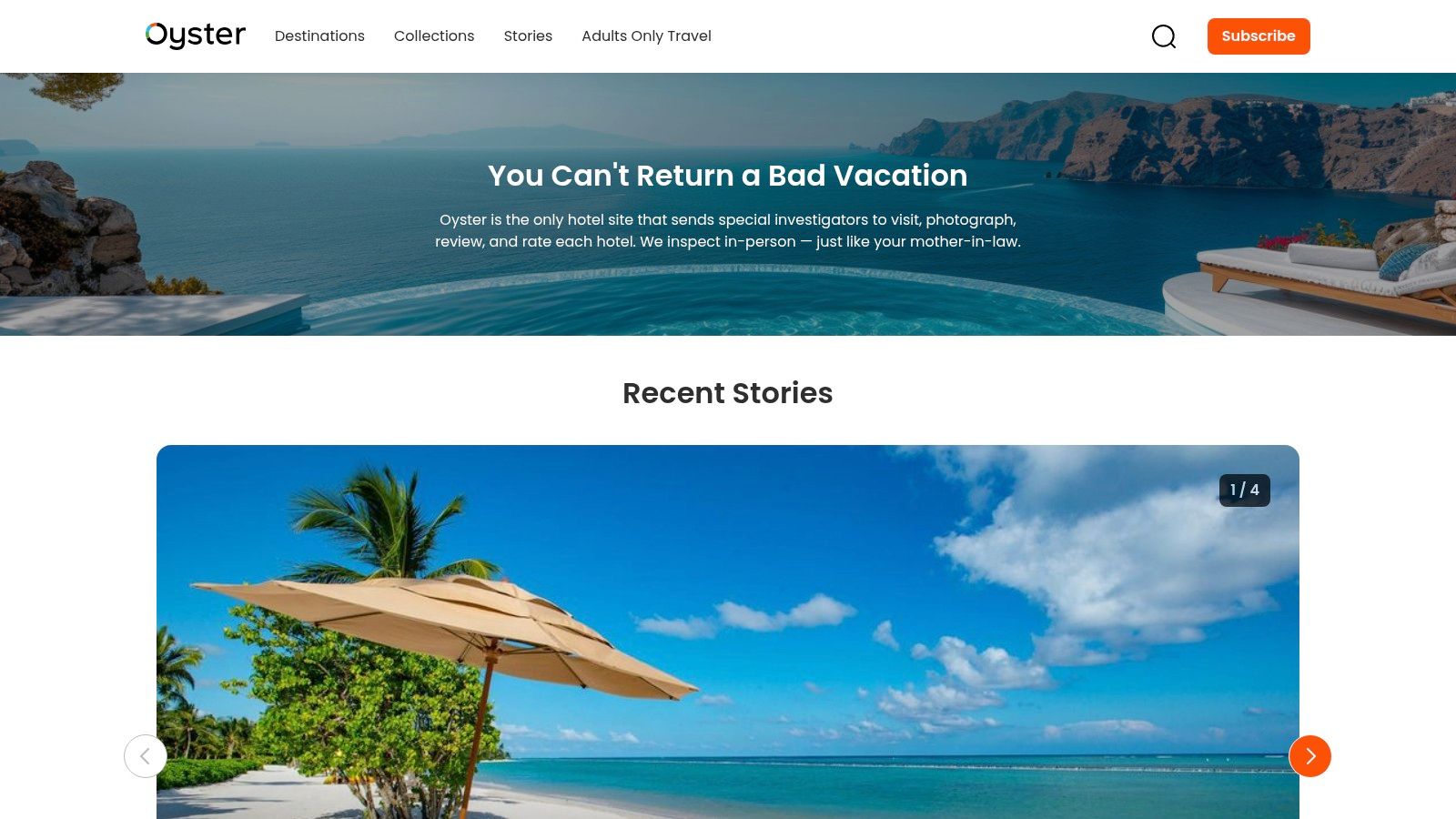
What truly distinguishes Oyster is its commitment to visual authenticity. Their reviewers take hundreds of high-quality, undoctored photos, showcasing everything from the thread count on the sheets to the grout in the bathroom tiles. These images are presented alongside the hotel’s own marketing photos, creating a powerful “Photo Fakeout” comparison. This direct, visual evidence allows users to see past the glossy brochures and make decisions based on reality, not just professional staging.
Key Features & User Tips
- Professional On-site Reviews: Every review is written by an expert who has physically stayed at and evaluated the property.
- High-Quality, Unedited Photos: Access a gallery of honest photos that reveal what the hotel actually looks like.
- Detailed Pros and Cons: Each review includes a clear, scannable list of the property’s specific strengths and weaknesses.
Practical Tip: Use Oyster’s “Photo Fakeout” feature as your go-to reality check. When you find a hotel you like on another site, search for it on Oyster to compare the official marketing images with their investigator’s candid shots.
| Pros | Cons |
|---|---|
| Unbiased, expert reviews provide high trust | Limited coverage compared to user-generated sites |
| Authentic visuals reveal a hotel’s true state | Fewer properties reviewed in more remote or less popular areas |
| “Photo Fakeout” feature is highly insightful | Reviews may not be as current as on more active platforms |
Website: https://www.oyster.com
12. Forbes Travel Guide
Forbes Travel Guide operates as the gold standard for luxury hospitality ratings, eschewing user-generated content in favor of professional, anonymous inspections. This platform is where travelers turn for verified excellence, as its team of expert inspectors evaluates properties against up to 900 objective, rigorous standards. The result is a curated list of Five-Star, Four-Star, and Recommended hotels, spas, and restaurants, offering a definitive guide to the world’s most exceptional travel experiences.
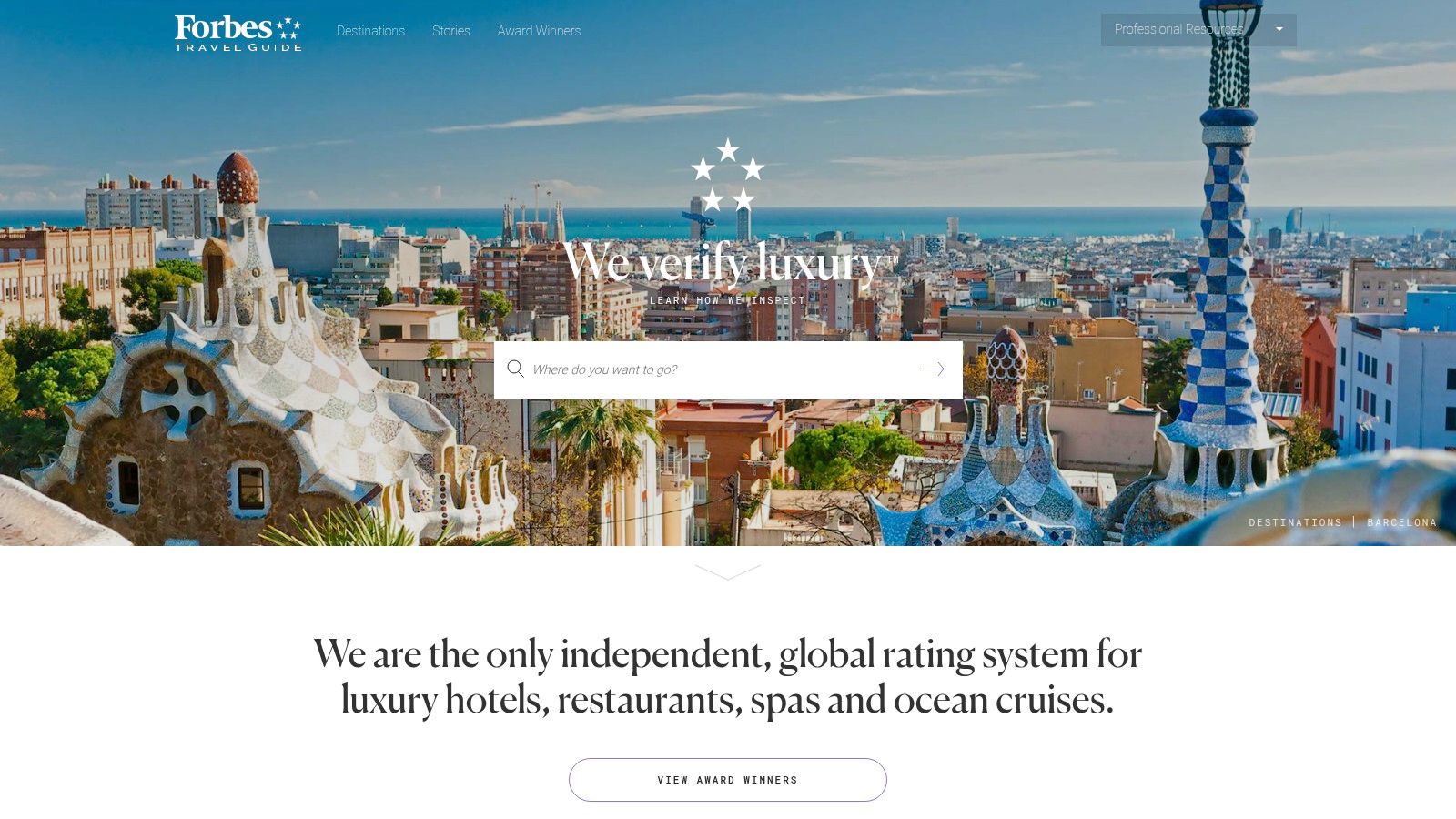
What truly distinguishes Forbes Travel Guide is its unwavering focus on service and quality at the highest level. Unlike other hotel rating websites that aggregate opinions, Forbes provides a single, authoritative rating you can trust. The detailed reviews accompanying each awarded property highlight specific elements of luxury and service, giving discerning travelers the confidence that their chosen accommodation meets the highest possible benchmarks. This makes it an indispensable resource for planning milestone trips or simply for those who accept nothing but the best. To understand more about how these prestigious ratings are determined, you can learn more about the hotel star rating system.
Key Features & User Tips
- Professional Star Ratings: Relies on a globally recognized system (Five-Star, Four-Star, Recommended) based on objective, in-person inspections.
- Anonymous Expert Inspectors: Properties are evaluated by incognito professionals, ensuring unbiased and authentic assessments of the guest experience.
- Luxury Focus: Specializes exclusively in high-end hotels, restaurants, and spas, providing curated recommendations for discerning travelers.
Practical Tip: Use Forbes Travel Guide not just for booking, but for inspiration. Exploring their “Verified Lists” for categories like “Most Luxurious Spas” or “Best Hotel Bars” can help you discover unique, high-quality experiences for your next luxury trip.
| Pros | Cons |
|---|---|
| Trusted, objective source for luxury travel | Focuses almost exclusively on high-end properties |
| Comprehensive evaluations by expert inspectors | Limited global coverage compared to crowd-sourced sites |
| Authoritative and highly respected ratings | No budget or mid-range accommodation options |
Website: https://www.forbestravelguide.com
Top 12 Hotel Rating Sites Comparison
| Platform | Core Features / Highlights | User Experience / Quality ★★★★☆ | Value Proposition 💰 | Target Audience 👥 | Unique Selling Points ✨ | Price Points 💰 |
|---|---|---|---|---|---|---|
| 🏆 HotelsEscape | Latest hotel news, exclusive deals, real reviews | Honest, in-depth reviews ★★★★☆ | Save money with flash sales & promotions 💰 | Budget to luxury travelers 👥 | Curated local restaurants & activities ✨ | Varies by deal 💰 |
| Tripadvisor | 1B+ user reviews, photos, detailed ratings | Diverse traveler feedback ★★★☆☆ | Free access to reviews 💰 | Global travelers 👥 | Massive community, up-to-date info ✨ | Free |
| Booking.com | 28M+ listings, verified guest reviews | Verified reviews ★★★★☆ | Loyalty program discounts 💰 | All travelers 👥 | Wide selection, Genius loyalty program ✨ | Varies, some non-refundable 💰 |
| Hotels.com | 500K+ properties, guest reviews | User-friendly, detailed filters ★★★★☆ | Free nights rewards 💰 | Frequent bookers 👥 | Rewards program, frequent discounts ✨ | Varies |
| Expedia | Hotels + flights + cars, verified reviews | Convenient booking ★★★☆☆ | Bundled services for savings 💰 | Package travelers 👥 | Multi-service platform ✨ | Often higher prices 💰 |
| Yelp | Business reviews, photos, location filters | Authentic user reviews ★★★☆☆ | Free to use 💰 | Local experience seekers 👥 | Community-driven, broad business scope ✨ | Free |
| Google Reviews | Integrated with Maps/Search, star ratings | Accessible, quick feedback ★★★☆☆ | Free & highly visible 💰 | General public 👥 | Direct Google integration ✨ | Free |
| Kayak | Price comparison from many sources | User-friendly search ★★★☆☆ | Best deal alerts 💰 | Deal hunters 👥 | Price alerts, multi-source aggregation ✨ | Free, booking external 💰 |
| Trivago | Price aggregator from 400+ sites | Easy price comparison ★★★☆☆ | Competitive pricing 💰 | Budget-conscious travelers 👥 | Extensive price comparisons ✨ | Free, booking external 💰 |
| Agoda | 2M+ properties, verified reviews | Focus on Asia, easy filters ★★★☆☆ | Member discounts 💰 | Asia-focused travelers 👥 | Strong Asian market presence ✨ | Competitive pricing 💰 |
| Oyster.com | Expert reviews, unedited hotel photos | Professional, unbiased ★★★★☆ | Trustworthy evaluations 💰 | Discerning travelers 👥 | In-depth expert reviews & photos ✨ | Free |
| Forbes Travel Guide | Professional star ratings, luxury focus | Luxury quality assurance ★★★★★ | Trusted luxury recommendations 💰 | High-end travelers 👥 | Anonymous expert inspections ✨ | Premium market 💰 |
Crafting Your Perfect Hotel Booking Strategy
Navigating the expansive digital landscape of hotel rating websites can feel like plotting a course through a labyrinth. With a dozen powerful platforms at your disposal, each offering unique strengths and perspectives, the path to the perfect stay isn’t about finding a single “best” site. Instead, it’s about crafting a personalized, multi-faceted booking strategy that leverages the distinct advantages of several tools in concert.
As we’ve explored, the journey from initial idea to confirmed reservation is best approached as a strategic, multi-step process. Think of it as assembling a team of expert advisors, each contributing their specialized knowledge to ensure your final decision is well-rounded and confident. This approach transforms booking from a chore into a calculated art, minimizing risk and maximizing the potential for a truly exceptional travel experience.
Synthesizing Your Hotel Research Workflow
The most effective strategy involves layering the insights from different types of platforms. A savvy traveler rarely relies on just one source of information. By combining aggregate data, verified user feedback, expert analysis, and visual evidence, you build a comprehensive picture of a property that marketing materials alone can never provide.
Here’s a practical, step-by-step workflow you can adapt:
- Start Broad with Meta-Search: Begin your quest on a meta-search engine like Kayak or Trivago. These tools are invaluable for casting a wide net, giving you a comprehensive overview of pricing and availability across multiple online travel agencies (OTAs) at once. This initial step establishes a crucial price baseline and reveals which platforms are offering the most competitive rates for your chosen dates.
- Dive Deep into Verified Reviews: Once you have a shortlist, move to platforms with a high volume of verified reviews. Booking.com and Agoda are leaders in this space, as their review systems are typically tied to completed stays. This “verified” status adds a layer of authenticity, helping you gauge real-world guest experiences regarding cleanliness, staff helpfulness, and amenity quality.
- Cross-Reference with Crowd-Sourced Wisdom: Next, consult a massive, crowd-sourced platform like Tripadvisor. While not all reviews are from verified guests, its sheer volume of user-submitted photos and detailed anecdotal feedback is unparalleled. Look for patterns in recent reviews to identify a hotel’s consistent strengths and persistent weaknesses.
- Perform a Visual Reality Check: To cut through professional marketing photos, turn to a specialist like Oyster.com. Their “Photo Fakeout” feature and honest, original photography provide an unfiltered look at what you can truly expect. This step is crucial for managing expectations and avoiding disappointment upon arrival.
- Consider Niche and Expert Opinions: For luxury travel, consulting the Forbes Travel Guide offers an unparalleled level of expert, objective evaluation based on hundreds of stringent standards. For local, everyday options or quick stays, even Yelp or Google Reviews can provide quick, relevant insights, especially for dining and nearby services.
By combining the algorithmic power of a meta-search engine, the verified trust of an OTA, the crowd’s wisdom from Tripadvisor, and the expert eye of a review specialist, you build a robust framework. This strategic triangulation of information is your best defense against booking mishaps and your greatest tool for discovering hidden gems. You are no longer just booking a room; you are engineering a successful stay.
Ready to stay ahead of the curve? For curated deals, insider tips, and breaking news from the world of travel, make HotelsEscape your go-to resource. We cut through the noise to bring you the information that matters, helping you make smarter decisions on all your future journeys. Explore our latest insights at HotelsEscape.



